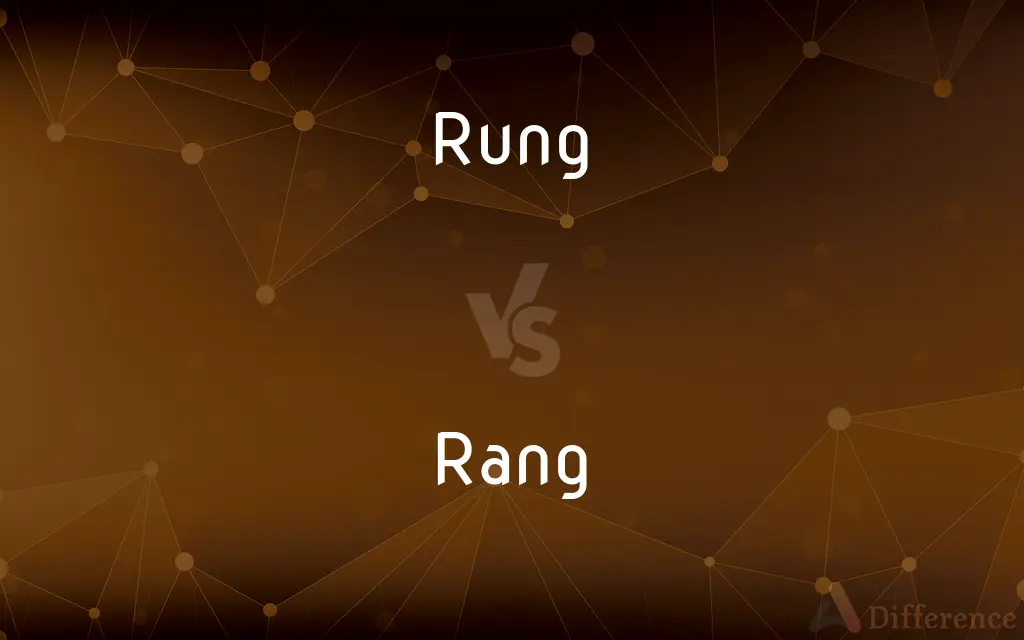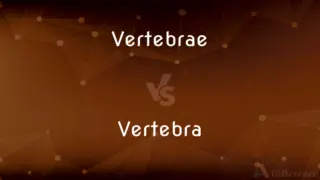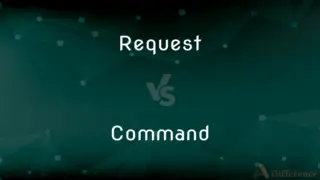Rung vs. Rang — What's the Difference?
By Urooj Arif & Fiza Rafique — Updated on April 29, 2024
"Rung" is the past participle of "ring", often referring to a position on a ladder, while "rang" is the simple past tense, typically used for sounds made by bells or telephones.

Difference Between Rung and Rang
Table of Contents
ADVERTISEMENT
Key Differences
"Rung" is primarily known as a noun referring to the horizontal bars on a ladder, providing steps for ascent or descent. Whereas, "rang" is used as a verb describing the action of making a resonant sound, as in a bell that rang at noon.
In its verbal form, "rung" serves as the past participle of "ring", used in perfect tenses, like in "The bell has rung". On the other hand, "rang" as the simple past tense of "ring", describes an action completed in the past, such as "The bell rang yesterday".
"Rung" can also metaphorically signify levels or stages in a hierarchy, such as "He's moved up a rung on the corporate ladder". Conversely, "rang" does not typically carry metaphorical uses and remains closely tied to the description of sounds.
The use of "rung" often pertains to structural or hierarchical contexts, emphasizing positions or levels within a defined framework. In contrast, "rang" generally focuses on auditory experiences and events, highlighting moments when sounds occur.
Both "rung" and "rang" derive from the verb "ring", but their uses diverge significantly in grammar and context. "Rung" as a noun and a part of compound tenses contrasts with "rang", which is strictly used in simple past narratives.
ADVERTISEMENT
Comparison Chart
Part of Speech
Noun (ladder part); verb (past participle)
Verb (simple past)
Typical Use
Steps on a ladder; completed action in compound tenses
Description of a sound made in the past
Contextual Usage
Hierarchical levels, structural elements
Auditory events, sound occurrences
Grammatical Role
Used in perfect tenses
Used in simple past tense
Example Sentence
He has just rung the bell.
He rang the bell at noon.
Compare with Definitions
Rung
Used in various idiomatic expressions.
He's moved up another rung on the corporate ladder.
Rang
Used to describe the past action of bells and similar instruments.
The church bell rang at dawn.
Rung
A level or rank in an organization.
She reached the upper rung of management.
Rang
To indicate a past event involving sound.
The alarm rang, waking everyone up.
Rung
One of the crosspieces forming the steps of a ladder.
He climbed to the top rung of the ladder.
Rang
Simple past tense of ring, indicating the sound made.
The phone rang loudly in the quiet room.
Rung
A stage in a process or series.
The next rung in his career ladder is a managerial position.
Rang
Used in storytelling to build atmosphere with sound.
A distant bell rang through the foggy night.
Rung
Past participle of ring (used in perfect tenses).
The bell has rung three times today.
Rang
Often used to set a time frame in narratives.
Just as the clock rang midnight, the party started.
Rung
A rod or bar forming a step of a ladder.
Rang
Past tense of ring2.
Rung
A crosspiece between the legs of a chair.
Rang
Only in senses related to a bell — etymology 2
Rung
The spoke in a wheel.
Rung
(Nautical) One of the spokes or handles on a ship's wheel.
Rung
A level or degree in a hierarchy
A middle manager awaiting a promotion to the next rung.
Rung
Past participle of ring2.
Rung
A crosspiece forming a step of a ladder; a round.
Rung
A crosspiece between legs of a chair.
Rung
(figurative) A position in a hierarchy.
The lowest rung of the society
Rung
A floor timber in a ship.
Rung
(dated) One of the stakes of a cart; a spar; a heavy staff.
Rung
One of the radial handles projecting from the rim of a steering wheel.
Rung
One of the pins or trundles of a lantern wheel.
Rung
Past participle of ring
Rung
Of a pig: having a ring through the nose.
Rung
A floor timber in a ship.
Rung
One of the rounds of a ladder.
Rung
One of the stakes of a cart; a spar; a heavy staff.
Rung
One of the radial handles projecting from the rim of a steering wheel; also, one of the pins or trundles of a lantern wheel.
Rung
A crosspiece between the legs of a chair
Rung
One of the crosspieces that form the steps of a ladder
Common Curiosities
In what tense is 'rang' used?
'Rang' is used as the simple past tense of the verb 'ring'.
What does 'rang' describe?
'Rang' describes the sound made by bells, phones, or similar objects in the past.
Is there a metaphorical use for 'rung'?
Metaphorically, 'rung' can describe levels or stages in a hierarchy, like in a company structure.
What scenarios typically use the word 'rang'?
'Rang' is typically used in scenarios involving sounds that occurred at a specific, past time.
Can 'rung' be used as a verb?
Yes, 'rung' is the past participle of 'ring', used in perfect tenses.
How are 'rung' and 'rang' related?
Both words derive from the verb 'ring', with 'rung' as the past participle and 'rang' as the simple past form.
What does the noun 'rung' refer to?
As a noun, 'rung' refers to the horizontal steps on a ladder.
Does 'rung' have any literal meanings besides being part of a ladder?
Literally, 'rung' specifically refers to the steps of a ladder, with no other direct meanings.
Can 'rung' be used outside of describing a ladder part?
Yes, 'rung' can also refer to levels within a hierarchy or organization.
Is 'rang' used in perfect tenses?
No, 'rang' is not used in perfect tenses; it is used in the simple past tense.
Share Your Discovery

Previous Comparison
Vertebrae vs. Vertebra
Next Comparison
Request vs. CommandAuthor Spotlight
Written by
Urooj ArifUrooj is a skilled content writer at Ask Difference, known for her exceptional ability to simplify complex topics into engaging and informative content. With a passion for research and a flair for clear, concise writing, she consistently delivers articles that resonate with our diverse audience.
Co-written by
Fiza RafiqueFiza Rafique is a skilled content writer at AskDifference.com, where she meticulously refines and enhances written pieces. Drawing from her vast editorial expertise, Fiza ensures clarity, accuracy, and precision in every article. Passionate about language, she continually seeks to elevate the quality of content for readers worldwide.













































